Unpacking Moralistic Narratives of the Israel/Palestine Conflict with a Theosophical Outlook
Source: @powerfultakes Twitter
A lot of rhetoric from prominent Israeli politicians sounds pre-genocidal. For instance, Israel’s President, Isaac Herzog stated that “there are no innocent civilians in Gaza,” and an Israeli defense official, proclaimed that "Gaza will turn into a tent city. No buildings will remain.” Even more liberal former Israeli PM, Naftali Bennett’s, response about humanitarian concerns was that, "Are you seriously asking me about Palestinian civilians? What is wrong with you? We're fighting Nazis." Then Bennett justified targeting civilians by pointing to the firebombing of Dresden. An Israeli military spokesperson warned that the “Residents of Gaza City should leave and not go back until we say so,” despite there being no safe passage out of Gaza. Though there are talks of opening up a passageway for Palestinians into Egypt, primarily due to pressure from the United States. The situation is murky, as Palestinians blamed Israel for an explosion at a hospital in Gaza, killing hundreds, while Israel and the mainstream media claim it was a Hamas rocket misfire. Though there is a case that Israel shutting down energy to hospitals is a violation of UN article 19. Israel turned water back on to parts of Gaza, though there is no energy to pump that water.
Source: @SwannMarcus89 Twitter
However, there are plenty of bad takes from the Pro-Palestinian side, such as Syrian Girl saying that unarmed Israeli ravers were not targeted, and that Hamas are treating the hostages kindly. It is notable that her coverage of the Syrian Civil War was excellent. Other examples are the Harvard letter stating that Israel was entirely to blame and BLM Chicago posting a pro-Hamas meme. Hamas’s brutal attack gave Israel carte blanche to attack Gaza, plus shifted Western opinion and moral capital way towards Israel’s side. Though that might change, depending upon how brutal Israel’s siege of Gaza is. Regardless, Hamas destroyed a lot of sympathy for the Palestinian cause.
While there is a lot of self-riotous bloodlust on both sides, a distinction must be made between a natural healthy reaction to atrocities, especially among those directly impacted, as opposed to those with zero connection caught up in the news cycles. Much like with the Russia/Ukraine war, people with “both sides” takes end up getting morally shamed and hated by both sides, which is anti-intellectual but reflects the reality that people are tribal rather than ideologically principled.
Many leftists believe that Israel has zero right to retaliate and should basically just sit back and do nothing. Even though I am generally non-interventionist, this extreme pacifist stance of automatically opposing any disproportionate response, or even the libertarian non-aggression principle, is overly idealistic and neglects historical realities. For instance, if a nation is attacked and does nothing it appears weak, despite Israel being far more powerful than Hamas. Throughout history, retaliatory strikes were generally more brutal, if the party attacked had the advantage to retaliate. Even dissident right figure, Nick Fuentes, who is not the biggest fan of Israel and the Jewish people, to put it mildly, acknowledged that any nation that is violently attacked has some right to retaliate.
Source: @TheMaverickWS Twitter
There is a middle ground that targeting Hamas is legit, as long as Israel is cautious to avoid civilian casualties. Even with past strikes on Gaza, Israel at least rhetorically, called for precision strikes that avoided civilian casualties. On one hand, it seems that Israel’s military is ruthlessly carpet bombing Gaza, with little regard for civilian deaths, as retribution. However, even with cautious precision strikes, civilian deaths are inevitable because Gaza is one of the most densely populated places on Earth. While it’s true that Hamas uses civilians as human shields, Israel uses that to blame all civilian deaths on Hamas, thus absolving themselves of all culpability. There is a case that Hamas can only be obliterated by a large-scale ground invasion, not just precision strikes, which entails mass casualties among civilians, as well as among Israeli soldiers. The current strikes aren’t enough to take out Hamas without bunker busters, as Hamas is likely hiding out in tunnels, and tunnel warfare is hell.
Source: @mtracey Twitter
Israel is playing hardball by cutting off water and energy in hopes that it will force Hamas to hand over the hostages, though there is a heightened risk that Hamas will kill the hostages if Israel flattens Gaza. Also granting the fate of all Gazans to Hamas grants them a degree of power, and makes the Palestinian people their hostages. Though much has changed, it is notable that in 2011, Israel exchanged 1,027 Palestinian prisoners for just one Israeli soldier, Gilad Shalit, despite many of those prisoners’ responsibility for killing 569 Israelis. While Israelis are willing to be more ruthless than Americans, who fight wars halfway around the Globe, it is much more personal, as they have skin in the game. Even as terrible of a warmonger and disastrous George Bush’s foreign policy was, the US was more cautious about avoiding mass civilian casualties in Iraq and Afghanistan than Israel is in Gaza. The geographic proximity with Israel being about the size of New Jersey, and sharing a border with its adversaries, complicates a lot of these moral narratives.
Source: @RichardHanania Twitter
A justification for collective punishment against Gaza is based on an assumption that most Gazans back Hamas. However, it is important to point out the responsibility that both America and Israel’s Governments had for Hamas’s rise to power. Former congressman, Ron Paul, pointed out that Israel initially encouraged Hamas, in order to undermine Yasser Arafat and sabotage a Two-State Solution. Then George Bush promoted "democracy" in Gaza, as a gesture for spreading democracy in the Middle East. However, once Hamas was elected, Bush sanctioned Hamas. This backfired, further empowering Hamas. Hamas then suspended elections, so it is hard to get an accurate assessment of how many Gazans support Hamas, as those who are anti-Hamas are targets of reprisal.
source: @wil_da_beast630 Twitter
It is naïve to assume that Israel knew nothing about Hamas planning a terror attack. It’s an unprecedented intelligence failure, especially considering that Israel has extremely advanced intel. It looks like Netanyahu had a direct warning from Egypt prior to the attack. However, that’s not the same as claiming an outright false flag, much like how claiming 9/11 was done by the CIA or Mossad is insane, while it was plausible that intel knew something was going to happen but did not act. Obviously this does not detract from Hamas’s atrocities, but does delegitimize Netanyahu, as his main case is being a hard-ass nationalist who can protect his people from terrorism. Another conspiracy theory is that anti-Netanyahu elements within IDF/Mossad allowed the terror attack to occur to sabotage Netanyahu’s judicial reforms. Though if anything, the attacks have empowered Netanyahu to consolidate power and quash dissent. Regardless, many Israelis, including ardent Zionists rather than peaceniks, are protesting and calling for Netanyahu to resign over his failure to protect Israeli citizens.
Source: @giantgio Twitter
Playing the blame game with this conflict is like the chicken vs. the egg dilemma, or a never ending vicious cycle. Israel makes Gaza as miserable as possible, basically an open air prison, then its residents become radicalized and dangerous, thus not worthy of negotiating peace with. Even if Israel deserves a significant amount of blame and Palestinians have legitimate grievances, Israelis are rational for being hesitant to hand over sovereignty or grant equal rights to an outgroup that hates their guts. The humanist position is right in that if you demonize an outgroup they will strike back. However, liberals are naïve to think that one can make concessions to a hostile outgroup. This applies to the debate about empathy for people who do terrible things due to their circumstances or acts of desperation. For instance, narratives about Islamic extremism and US foreign policy, inner-city crime, and alienated mass shooters, which get moralized or shaped by tribal dichotomies.
Source: @mtracey Twitter
If you want to call Israel an Apartheid state, fine, but ending Apartheid in South Africa did not turn out so great. US foreign policy contributed to radicalizing Muslims but it’s also true that Muslims are vastly overrepresented among non-State acts of terrorism. Thus the West is rational for not wanting significant Muslim immigration. This even applies to Scotts Adams’ point that basically Blacks have legitimate historical grievances against Whites, but if Blacks deeply resent Whites than Whites are rational for avoiding Blacks. However, it is notable that Sweden has gone out of their way to accommodate Muslim immigrants, who in turn disrespect Swedish culture and commit a lot of violent crime.
Ben Shapiro threw a hissy fit after Tucker Carlson brought up reasonable concerns about America’s drug overdose crisis, in a discussion with presidential candidate, Vivek Ramaswamy, about the war. Ben Shapiro’s rhetoric is identical to Bush era neocons, implying that Tucker Carlson’s America First, albeit tepid pro-Israel stance, enables Hamas and haters of Israel on the left. One can be pro-Israel yet still acknowledge that the idea that the US and Israel have the exact same interests is absurd. Ben Shapiro has a very rigid moral worldview and morally blackmails those he disagrees with. Much like the woke left and Black Lives Matter, he imposes his ethnocentric/tribal bias upon a universalistic moral narrative. While both neocons and the left have a hyper-moralistic worldview, Trump, despite his many flaws, was more of a foreign policy realist (realpolitik). Basically conducting diplomatic and policy decisions on the given circumstances rather than any explicit ideological or moral agenda. More like Richard Nixon than George Bush.
Source: Aljazeera
While moralistic victimhood narratives are at odds with Nietzschean master morality, they can be effective forms of soft power. For instance, the history of antisemitism as justification for Israel’s actions, or the Palestinian side’s anti-colonial arguments, or just that Palestinians are virtuous by being powerless. This applies to the debate over casualties, as the pro-Palestinian side claims the moral high ground because overall far more Palestinians have been killed by Israel than vice versa. The Israeli counter-argument is that Palestinians have sabotaged peace offers, and unlike Israel, directly target civilians in terror attacks. The Palestinian rebuttal is that Israel has no interest in a Two-State Solution, and only uses it as a bargaining chip. Both sides also feel the need to justify their self-determination with liberal arguments. For instance, the Palestinian side makes the case that they are victims of White Supremacy, like George Floyd, or the case that Israel is superior because it is more feminist and pro-LGBTQ, as well as the only democracy in the Middle East. Though there is a case that Israel is not a full democracy, and there are wartime crackdowns on free speech.
Source: @Blair_A_Nathan Twitter
While there are plenty of legitimate criticisms of Israel’s human rights record, there is some debate about whether Israel is singled out over other nations with terrible human rights records, such as China, North Korea, Iran, or Saudi Arabia. While a decent amount of people who single out Israel over other nations probably don’t care for Jews, a lot of that is due to resentment over US favoritism towards Israel, as well as anti-White leftists who view Israel as a White colonial enterprise. However, it is an issue of friend/enemy distinctions, rather than the moral high ground. These are age old Middle Eastern blood feuds, which you can’t hold to Anglo liberal standards and ideals. From an American perspective, the most important thing is not getting entangled in another major Middle Eastern conflict, which is looking increasingly likely.
In principle, every ethnic group is entitled to self-determination, though it is more difficult to guarantee in practice. This is especially the case somewhere as crowded and with limited space like Israel and Palestine, where both groups lay claim to the same territory. However, even the ideal of ethnopluralism or symmetrical multiculturalism, which I promote, has its limitations due to power dynamics. Basically the conflict is a power struggle between two ethnocentric groups, with one side having a modern, first world military, and the other engaging in Fourth Generation Warfare. I am pessimistic about any peaceful reconciliation or compromise, as both sides will likely get further radicalized by the conflict. While there are plenty of people on both sides who just want to live normal lives in peace, a cold, anti-humanist, amoral way of looking at the conflict, is that Palestinians would be better off if all Israelis emigrated to the West, and Israelis if all Palestinians fled, either to neighboring Arab nations or as refugees to Europe.
Source: @martyrmade Twitter
While one can call out actions of both Israelis and Palestinians as immoral, both sides are rational for taking their own side in the conflict, and for having some degree of contempt for the other side. If I were Israeli or Jewish, I would probably be a Zionist, and if I were Arab, I would probably support the Palestinian cause. Understanding that is the only way one can have a clear, level headed, assessment of the conflict. I proclaim that both #Israelilivesmatter and #Palestinianlivesmatter, and that both #Whitelivesmatter and #Blacklivesmatter. That pisses people off even more than #alllivesmatter, but it acknowledges some level of humanism, while also that they all matter because they matter to those particular groups. Its an acknowledgement that everyone has a right to look out for their tribe.
There is nothing wrong with being ethnocentric or tribal but it muddies the water when ethnocentric arguments are framed in universalistic, good vs. evil binaries. This also ends up leading to worse dehumanization of outgroups than honest, upfront tribalism. It is fine to hate people who want to cause you or your ingroup harm, or to have resentment over having to compete over limited resources. However, everyone accepting that everyone else has their own ingroup bias and agency, is a better way to resolve conflicts. Reciprocity is the basis for different groups coexisting not hyper-moralism, and there is no reciprocity between the Israelis and Palestinians.
Morality, including religion, has adapted to serve tribal interests and biological imperatives. With that realization, one can either go in a totally nihilistic, or “might makes right” Social Darwinist direction, or one can embrace the philosophy of Theosophy, dualism, and moral pluralism. From there, one must try to decipher what is a divine or universal morality, and what is subjective based upon biological, tribal, or practical circumstances. This dualism can be explained by how people generally have some degree of compassion for outgroups, and a revulsion to unnecessary violence and suffering. However, in tribal conflicts, people will be ruthless towards outgroups, if they view that as the only way to preserve their people’s lives or sovereignty. People are not purely tribal but there is a spectrum of familiarity from family to ethnicity to nation to humanity and then to animals. America/Anglosphere, Israel, and Arab nations are all heavily influenced by Abrahamic moral absolutism that struggles with dualism. Not to mention that most people lack the cognitive ability for moral complexity.

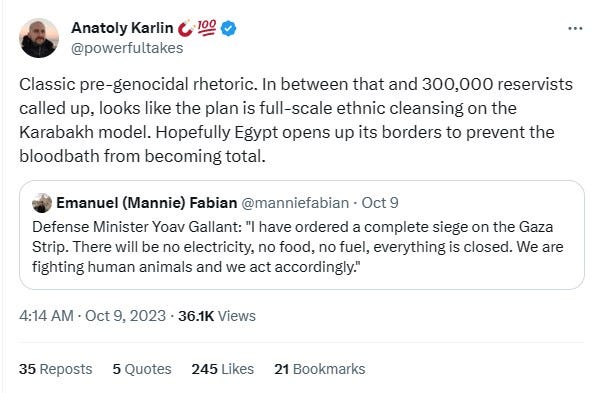
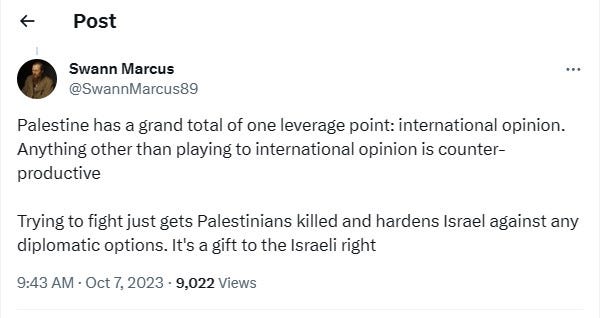

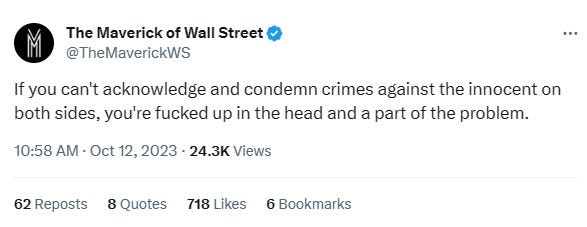
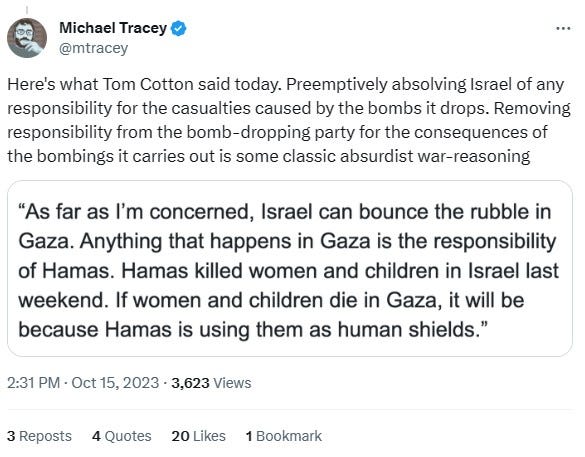

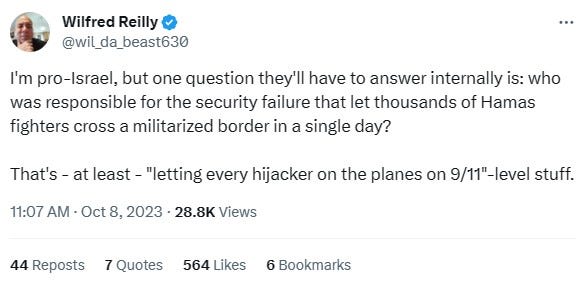
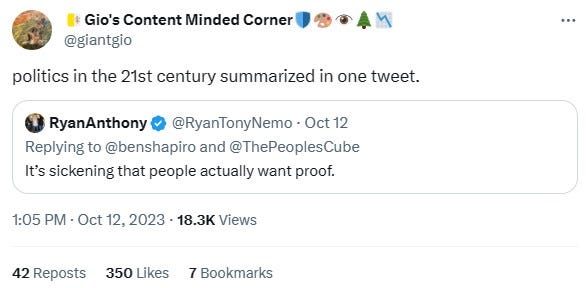
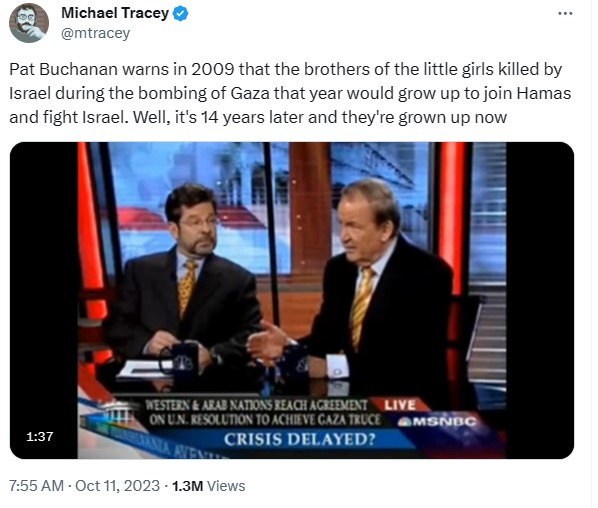
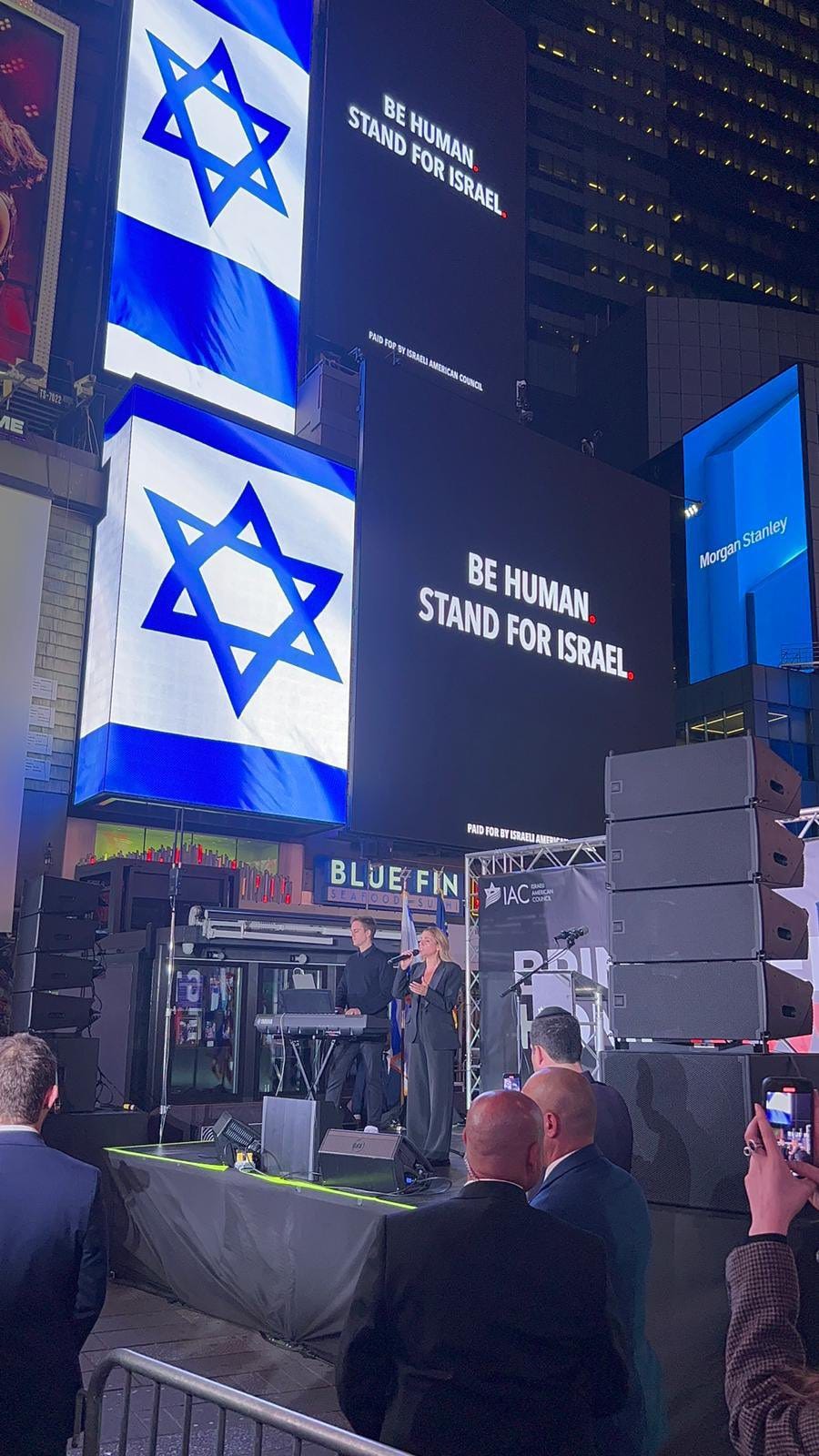
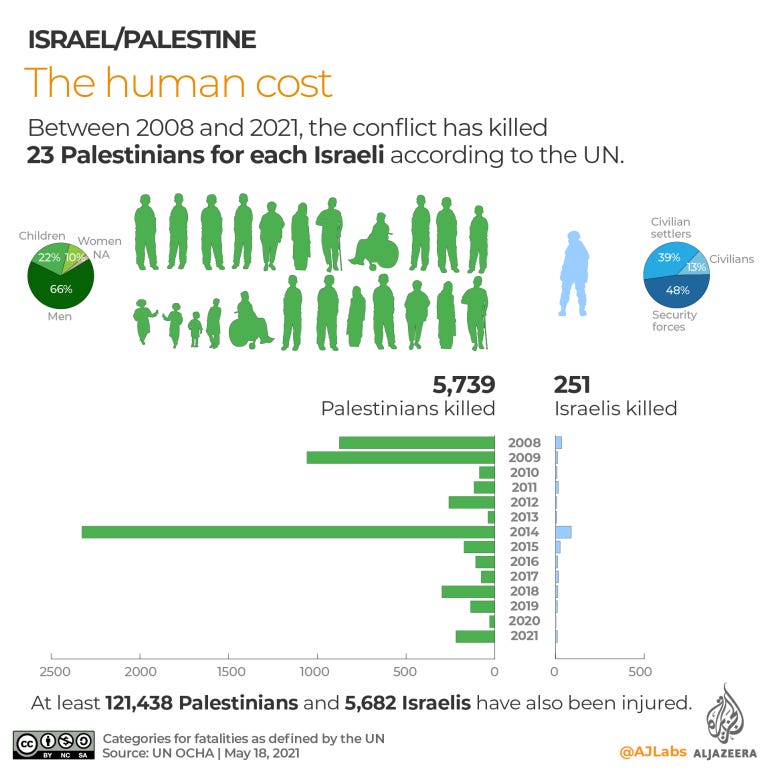
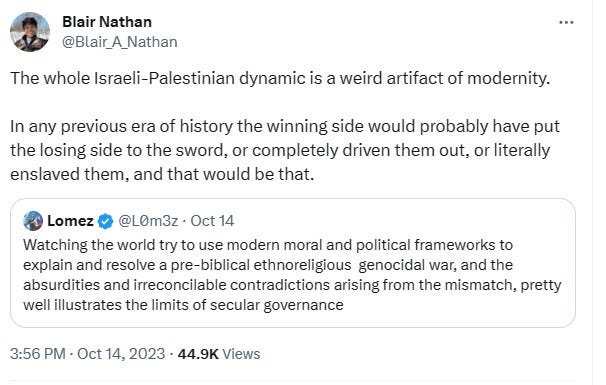
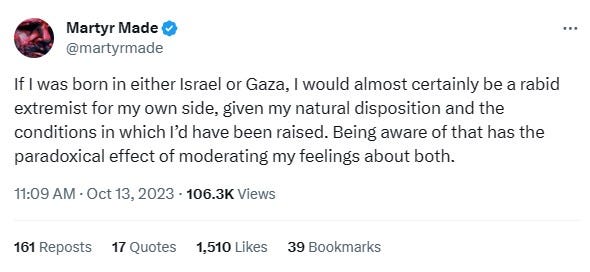
This is a good balanced article. Rare these days.
If the Arabs laid down their arms there would be peace with Israel. If Israel laid down their arms there would be no Israel.